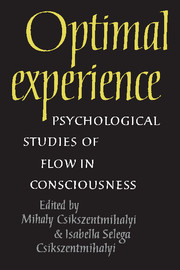Book contents
- Frontmatter
- Contents
- Acknowledgments
- Contributors
- I A THEORETICAL MODEL OF OPTIMAL EXPERIENCE
- II VARIETIES OF THE FLOW EXPERIENCE
- III FLOW AS A WAY OF LIFE
- 11 Introduction to Part III
- 12 Modernization and the changing contexts of flow in work and leisure
- 13 Ocean cruising
- 14 Flow in a historical context: the case of the Jesuits
- IV THE MEASUREMENT OF FLOW IN EVERYDAY LIFE
- References
- Name index
- Subject index
11 - Introduction to Part III
Published online by Cambridge University Press: 05 June 2012
- Frontmatter
- Contents
- Acknowledgments
- Contributors
- I A THEORETICAL MODEL OF OPTIMAL EXPERIENCE
- II VARIETIES OF THE FLOW EXPERIENCE
- III FLOW AS A WAY OF LIFE
- 11 Introduction to Part III
- 12 Modernization and the changing contexts of flow in work and leisure
- 13 Ocean cruising
- 14 Flow in a historical context: the case of the Jesuits
- IV THE MEASUREMENT OF FLOW IN EVERYDAY LIFE
- References
- Name index
- Subject index
Summary
Why are flow experiences so few and far between in everyday life? The question is partly rhetorical, since it admits no scientific answer. Yet by thinking about its implications, we may not only clarify what flow is about, but may also shed some new light on important historical and institutional patterns of development, and hence on the evolution of culture.
The relative rarity of flow experiences is due, by definition, to the fact that in everyday life the opportunities for action are seldom evenly matched with our abilities to act. Consequently occasions of intense concentration in which we are not distracted from purposeful involvement, in which we get responsive feedback to our actions, are not easy to come by. Everyday experience is characterized more by listless, low level involvement interrupted by constant distractions, by boredom, and by periods of worry.
One might blame the social system for such a state of affairs, or the culture, or the individual's lack of enterprise and self-discipline. Any or all of these causes may be responsible for not optimizing experience to its fullest. But in the last analysis the culprit is that quasi-metaphysical entity known as “the human condition.”
The fact is that the universe does not run in order to make life easier for man. Thus whatever advantage we can manage to snatch from the environment we do in spite of impersonal forces and in the face of random chance.
- Type
- Chapter
- Information
- Optimal ExperiencePsychological Studies of Flow in Consciousness, pp. 183 - 192Publisher: Cambridge University PressPrint publication year: 1988
- 7
- Cited by



